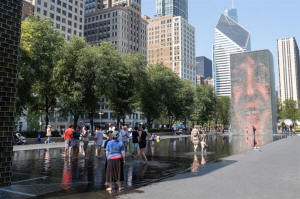Illinois heat wave is the latest of several weather extremes in the
state
 Send a link to a friend
Send a link to a friend
[August 25, 2023]
By ANDREW ADAMS
Capitol News Illinois
aadams@capitolnewsillinois.com
 Illinois is roasting in triple digit temperatures this week, forcing the
state and schools to cancel some outdoor activities and modify class
schedules. Illinois is roasting in triple digit temperatures this week, forcing the
state and schools to cancel some outdoor activities and modify class
schedules.
Every county in Illinois was under an excessive heat warning Thursday
morning, with some areas expected to continue to be under advisory until
at least Friday evening.
The heat index, a measure that combines air temperature with humidity,
reached higher than 128 degrees in Galesburg Wednesday. Chicago’s O’Hare
airport recorded an air temperature of 98 degrees, the highest
temperature for Aug. 23 since 1947, according to the National Weather
Service. The heat index there peaked at 116, just two degrees shy of the
record high that came during Chicago’s infamous 1995 heat wave.
“Exposure to extreme heat can cause serious health complications,
including heat exhaustion and heatstroke,” IDPH Director Sameer Vohra
said in a Tuesday news release. “With dangerously high temperatures and
humidity in the forecast, I urge everyone to take precautions and
protect themselves and their families from overheating and heat related
illnesses.”
Vohra added that very young children, pregnant people, older adults and
those with chronic health conditions should be particularly wary.

IDPH issued several guidelines to protect against heatstroke and heat
exhaustion, including seeking air-conditioned areas like shopping malls
or libraries during the day, wearing lightweight and light-colored
fabrics and reducing strenuous and outdoor activities, particularly
between 10 a.m. and 4 p.m.
People experiencing body temperatures above 103 degrees, difficulty
breathing, elevated heart rate, skin that is hot to the touch,
dizziness, nausea or disorientation should call 911 immediately, IDPH
advised.
The state’s emergency management agency also updated its website to
point to a list of “cooling centers” around the state compiled by an
interagency group, although as of Thursday afternoon the webpage does
not list any cooling centers south of Urbana.
The state also canceled several upcoming outdoor events, including the
Du Quoin State Fair parade which was scheduled for Friday evening.
“With forecasts projecting a high of 100 degrees and heat indexes
between 111 and 117 degrees, we feel canceling the parade is in the best
interest of our parade participants,” Illinois Department of Agriculture
Director Jerry Costello II said in a Wednesday news release. “This is
not to take away from people enjoying the fair safely, but to avoid a
clustering of families along the parade route and parade participants in
costumes and uniforms from overheating.”
The Department of Agriculture, which manages the fair in Du Quoin, also
canceled Thursday’s Illinois Product Farmers Market in Springfield due
to the heat.
Other state agencies have also had to adjust to protect workers from the
heat, including the Department of Transportation. A department
spokesperson said that, in addition to monitoring for pavement buckling,
state crews and some contractors have had to adjust their work schedules
to avoid the hottest part of the day.
Communities across Illinois are also being forced to alter school
schedules to accommodate the heat.
Schools in Champaign-Urbana canceled class Thursday. Champaign’s school
district reported “major failures” at two of their largest school
campuses. In northern Illinois, Maple Park schools closed, citing
“extremely challenging” circumstances for drivers and students on buses.

[to top of second column]
|

Chicagoans look to beat the heat at the
Crown Fountain in downtown Millennium Park Thursday afternoon.
(Capitol News Illinois photo by Andrew Adams)

Beyond academics, schools have also canceled and modified plans for
athletic events.
While the Illinois High School Association, which sets rules for high
school athletics, does not track changes to athletic events during the
regular season, IHSA spokesperson Matt Troha told Capitol News Illinois
the heat has had a “significant impact” on IHSA sports.
IHSA requires schools to move practices and games indoors or cancel then
if the “wet bulb globe” temperature exceeds 89.9 degrees. Wet bulb globe
temperature combines air temperature, sun exposure, humidity and wind.
While the IHSA does not require schools to let them know of changes to
athletic schedules, Troha noted that the association was anecdotally
aware of many games being moved to later times of day or to different
days.
Before this week’s record heat, much of Illinois experienced severe
drought conditions from May through July, with the peak of the drought
coming in June.
This led to the federal Department of Agriculture to issue a series of
disaster designations. The designations, which are centered on
McDonough, McHenry and Mercer counties, are a follow-up to a previous
set of disaster designations from earlier this season. The
classification allows the USDA to provide emergency loans to farmers
recovering from the droughts.
“While we are seeing improvement in drought conditions across the state,
we know that crops and livestock have been impacted,” Illinois
Department of Agriculture Director Jerry Costello II, said in a news
release Wednesday announcing the designations.
Jeff Kirwan, a farmer in Mercer County and board member of the Illinois
Farm Bureau, said the droughts have negatively impacted crops in
Illinois.
“Especially in June, that’s the most stressful time for farmers,” Kirwan
said. “We had a good crop, but then it didn’t rain.”

Kirwan later added that overall, he expects the corn and soybean crop to
be around average, although some farmers in areas hit hardest by drought
may struggle more.
“The emotion that goes with that was extremely unsettling, very
stressful," he said of the recent drought.
In addition to the heat wave and drought, Illinois has also seen several
damaging storms and the most tornadoes of any state so far this year.
A series of severe storms and flooding between June 29 and July 2 also
drew the attention of the federal government, with President Joe Biden
approving federal assistance through the Federal Emergency Management
Agency. This assistance will go to individuals and businesses in Cook
County and can include grants for temporary housing and home repairs and
low-interest loans to cover property losses.
“Residents and businesses, especially those on the West Side of Chicago
who were most brutally hit, are now able to access additional resources
necessary to rebuild and revitalize, and I know Cook County will build
back stronger than ever,” Gov. JB Pritzker said in an August 15 news
release.
Capitol News Illinois is a nonprofit, nonpartisan news
service covering state government. It is distributed to hundreds of
print and broadcast outlets statewide. It is funded primarily by the
Illinois Press Foundation and the Robert R. McCormick Foundation, along
with major contributions from the Illinois Broadcasters Foundation and
Southern Illinois Editorial Association. |